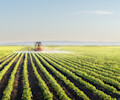The link between biodiversity and sustainability
Every species, no matter how small, plays a role in maintaining ecosystems that support animal and human life. Together they carry out natural processes to protect water resources, soil formation, nutrient storage and recycling, and pollution breakdown and absorption; to provide us with food and medicine; and add to our economy. A healthy biodiversity therefore contributes to the maintenance of ecosystems, climate stability, food security, adequate nutrition, and sustainable livelihoods.
Why agricultural biodiversity is important
Biodiversity and agriculture are strongly interdependent. Biodiversity is the origin of all species and varieties of crops and livestock. Agriculture, in turn, can promote biodiversity.
Of the 250,000 to 300,000 known edible plant species, only 150 to 200 are thought to be widely used by humans. Just 12 plants and five animal species provide three-quarters of the world’s food, with more than half of the world’s calories coming from a limited number of varieties of three “mega-crops”: rice, wheat, and maize. At the same time, 30% of livestock breeds are at risk of extinction.
The global food supply is increasingly under threat from world population growth, climate change, and the introduction and spread of disease. Agricultural biodiversity is vital to ensuring a robust food security system capable of meeting human nutritional needs and safeguarding genetic traits that could be used to combat future outbreaks.










